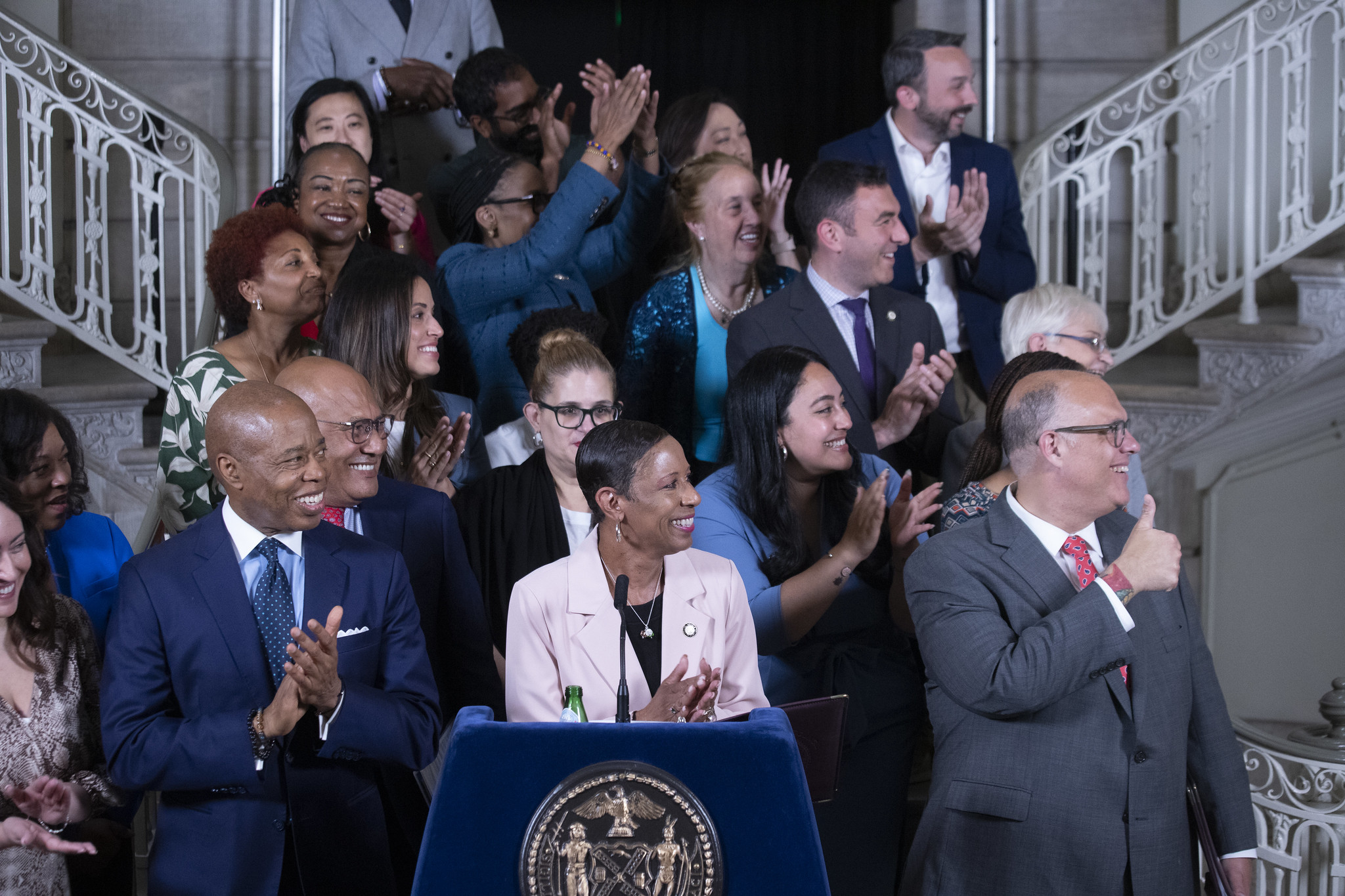Millions for the Department of Sustainable Delivery, but not one cent to explain it.
The $116-billion budget passed by the City Council on Monday included $6.1 million for a version of the mayor's “Department of Sustainable Delivery” — but no one is explaining what that is, except for being more enforcement against e-bike-riding workers instead of regulation of the companies profiting off their labor.
The budget itself says the money will fund a "Department of Sustainable Delivery" inside the existing Department of Transportation "to regulate commercial e-bikes, including 60 positions for regulation and enforcement."
It added that $6.1 million will be required "at full ramp-up” and that the focus of the new department-in-a-department will be on “e-bike enforcement,” not the myriad of other reform ideas that have been proposed to regulate the rogue delivery app industry.
At a press conference ahead of the Council’s budget vote, Council Speaker Adrienne Adams told Streetsblog that the mayor would know more about this budget line that was added at the 11th hour of his negotiations with the Council.
“Well, the mayor would have the big picture on the department itself, which we are anxious to see,” said the Speaker, who received a broad proposal from the mayor last year, yet did not advance it. “Anything legislatively, we are going to be looking towards working with the administration to make that happen. … The specifics will have to come through the legislation and are going to be brought to the Council, we just realize this is an agency, holistically, that should happen.”
The administration told Streetsblog over the weekend that the new office inside the DOT would in fact be focused on e-bikes, and also urged the Council to take action to further regulate the app companies.
“At town hall after town hall, New Yorkers have repeatedly called on the city to increase regulations for e-bikes,” the City Hall spokesperson said. “Now, after nine months of ignoring New Yorkers and inaction by the City Council, the Adams administration included money in the budget that will allow the Department of Transportation to finally create a new division to assist in regulating apps that use e-bikes under the existing traffic code. ... There is still a need for the Council to pass legislation that would further expand licenses to all delivery app companies and we will continue our push for this crucial legislation in the coming days.”
This finger-pointing is nothing new.
Mayor Adams revealed his idea for the Department of Sustainable Delivery back in January 2024, and since then the two sides of City Hall have been fighting over whose responsibility it is to move forward with the promise.
In February 2025, a 28-page draft bill was leaked to reporters. But it remained on the Speaker's desk, with no signs of movement.
But in late April, Adams and NYPD Commissioner Jessica Tisch launched a crackdown on e-bikes, which the mayor later said was necessary because the Council had blown off his proposal, and the finger pointing came to a head in a meme-war on X.
As we said last week, the administration never discussed its proposal for a 15 MPH speed limit with the Council. The mayor has repeatedly failed to demonstrate an understanding of the city's lawmaking process, which has made him ineffective. We remain in discussions with… pic.twitter.com/70gvbMyHjl
— New York City Council (@NYCCouncil) June 9, 2025
A Council spokesperson told Streetsblog that budget announcement basically amounts to the administration allocating money before the details are ironed out. The spokesperson added that the Council doesn't usually pass omnibus bills, like the Sustainable Delivery bill proposed by the administration, especially when individual Council Members already have bills in the pipeline with overlapping priorities.
Advocates respond
Delivery workers, who have the most riding on any regulation, are confused.
“We are looking forward to understanding more details,” said Gabriel Montero, the communications director for Los Deliveristas Unidos – which is part of the Worker’s Justice Project.
Montero said the organization had not gotten any heads-up about this addition to the budget, and said the language used in the announcement, which calls out “regulating commercial e-bikes” was short-sighted and omits the two big picture issues: a need for more safe cycling infrastructure, and stricter regulation on corporations, like Uber, DoorDash, and Grubhub (now owned by Wonder), that contract the workers.
To Montero, the complaints about e-bikes that the Adams administration uses to justify the recent crackdown are the result of the unregulated delivery industry outpacing the city’s infrastructure.
“It’s a systemic failure to redesign the streets in the wake of an industry that is already reshaping the streets,” said Montero. “We think that’s a glaring omission and we want to understand better what the department would do. [The administration] is looking at the problem as one of individual behavior and not one of systemic issues.”
The Department of Transportation did not respond to Streetsblog's request for comment.






